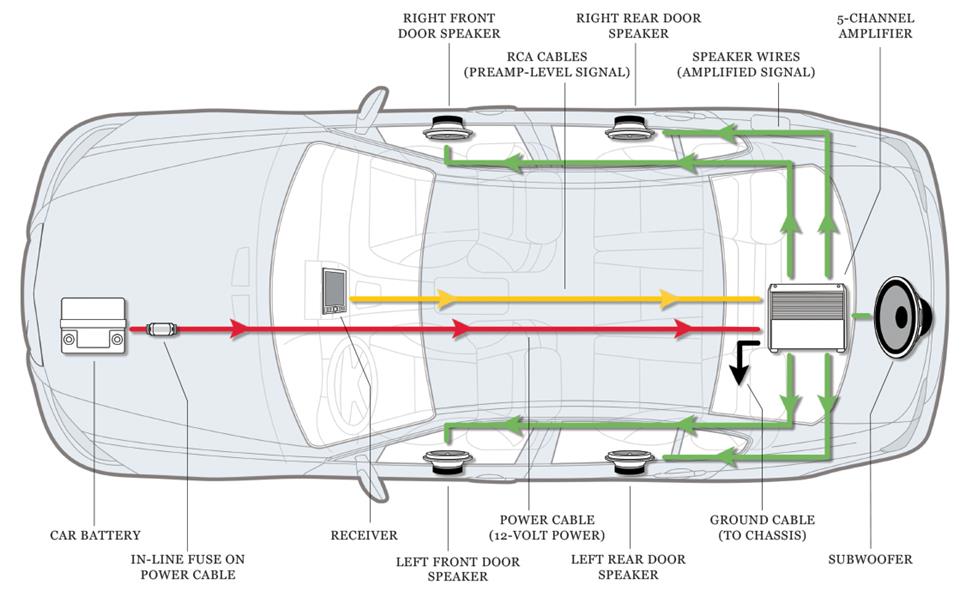Crank Up Your Ride: The Ultimate Guide to Car Subwoofer Amplifiers

Want to transform your car into a rolling concert hall? A powerful car subwoofer amplifier is the key to unlocking deep, resonant bass that truly elevates your listening experience. But choosing the right amplifier can be daunting, with a plethora of specs, brands, and features to consider. This comprehensive guide breaks down everything you need to know about car subwoofer amplifiers, empowering you to make the best choice for your audio setup.
Car audio has evolved dramatically since the days of basic AM radios. Today's drivers demand high-fidelity sound, and a quality subwoofer amplifier is essential for achieving the full sonic potential of a subwoofer. A subwoofer amplifier, unlike a standard car stereo amplifier, is specifically designed to power the low-frequency demands of a subwoofer. This dedicated power delivery ensures that the subwoofer can accurately reproduce the deepest bass notes without distortion, providing a richer, more immersive listening experience.
The genesis of dedicated subwoofer amplifiers coincided with the rise in popularity of car audio systems in the late 20th century. As drivers sought more impactful bass, engineers developed specialized amplifiers to handle the increased power requirements of subwoofers. Early subwoofer amplifiers were often bulky and inefficient, but advancements in technology have led to smaller, more powerful, and energy-efficient designs.
A subwoofer amplifier plays a pivotal role in the overall performance of a car audio system. It's responsible for taking the low-frequency audio signal from the head unit and boosting it to a level that can drive the subwoofer. Without a dedicated amplifier, the subwoofer would be underpowered, resulting in weak, muddy bass. A properly matched amplifier ensures that the subwoofer can reproduce the full range of bass frequencies with clarity and impact.
One of the common issues related to car subwoofer amplifiers is impedance mismatch. Connecting a subwoofer with an impedance that doesn't match the amplifier's output can lead to overheating, reduced performance, and even damage to both components. Understanding the relationship between impedance and power is crucial for ensuring the longevity and optimal performance of your car audio system.
Impedance, measured in ohms, represents the resistance to the flow of electrical current. Matching the impedance of your subwoofer to the amplifier is essential. For example, a 4-ohm subwoofer should be connected to a 4-ohm stable amplifier. Wiring multiple subwoofers can alter the overall impedance, so careful calculation is necessary when dealing with multiple subs.
Benefit 1: Enhanced Bass Response: A dedicated subwoofer amplifier provides the necessary power to drive the subwoofer effectively, resulting in deep, powerful bass that enhances the overall listening experience.
Benefit 2: Improved Sound Clarity: By relieving the head unit from the burden of powering the subwoofer, a dedicated amplifier allows the head unit to focus on powering the other speakers, leading to improved clarity and detail across the entire audio spectrum.
Benefit 3: System Flexibility: Using a separate amplifier for the subwoofer offers greater flexibility in system design. It allows for upgrading the subwoofer or amplifier independently, providing a path for future system expansion.
Choosing the right car subwoofer amplifier involves considering several factors: power handling, impedance matching, and features. Start by determining the RMS power handling of your subwoofer. The amplifier's RMS power output should match or slightly exceed the subwoofer's RMS power handling. Next, ensure impedance compatibility. Finally, consider features like bass boost controls, crossovers, and remote gain control.
Advantages and Disadvantages of Car Subwoofer Amplifiers
| Advantages | Disadvantages |
|---|---|
| Enhanced Bass Response | Increased Power Consumption |
| Improved Sound Clarity | Installation Complexity |
| System Flexibility | Potential for Overheating |
Best Practice 1: Proper Wiring: Use high-quality wiring and connectors to ensure efficient power delivery and prevent voltage drops.
Best Practice 2: Secure Mounting: Securely mount the amplifier to prevent damage from vibrations and ensure proper heat dissipation.
Best Practice 3: Setting Gain: Properly adjust the gain control to match the input signal and prevent clipping, which can damage the subwoofer.
FAQ 1: What is RMS power? RMS power is the continuous power an amplifier can deliver.
FAQ 2: What is impedance? Impedance is the resistance to the flow of electrical current.
Tips and Tricks: Use a sound meter to fine-tune the gain settings for optimal performance. Consider using a capacitor to provide additional power reserve for demanding bass passages.
In conclusion, a car subwoofer amplifier is an essential component for any serious car audio enthusiast. From adding depth and richness to your favorite tracks to enhancing the overall listening experience, a properly chosen and installed amplifier can dramatically elevate your car audio system. By understanding the key concepts of power handling, impedance matching, and proper installation, you can unlock the full potential of your subwoofer and enjoy powerful, distortion-free bass on every drive. Taking the time to research and invest in a quality amplifier will pay dividends in sonic satisfaction for years to come. So, crank up the volume and experience the transformative power of a dedicated car subwoofer amplifier.
Elk river trail a strathcona park adventure
Powerful political posters through time
Finding peace amidst ac noise













